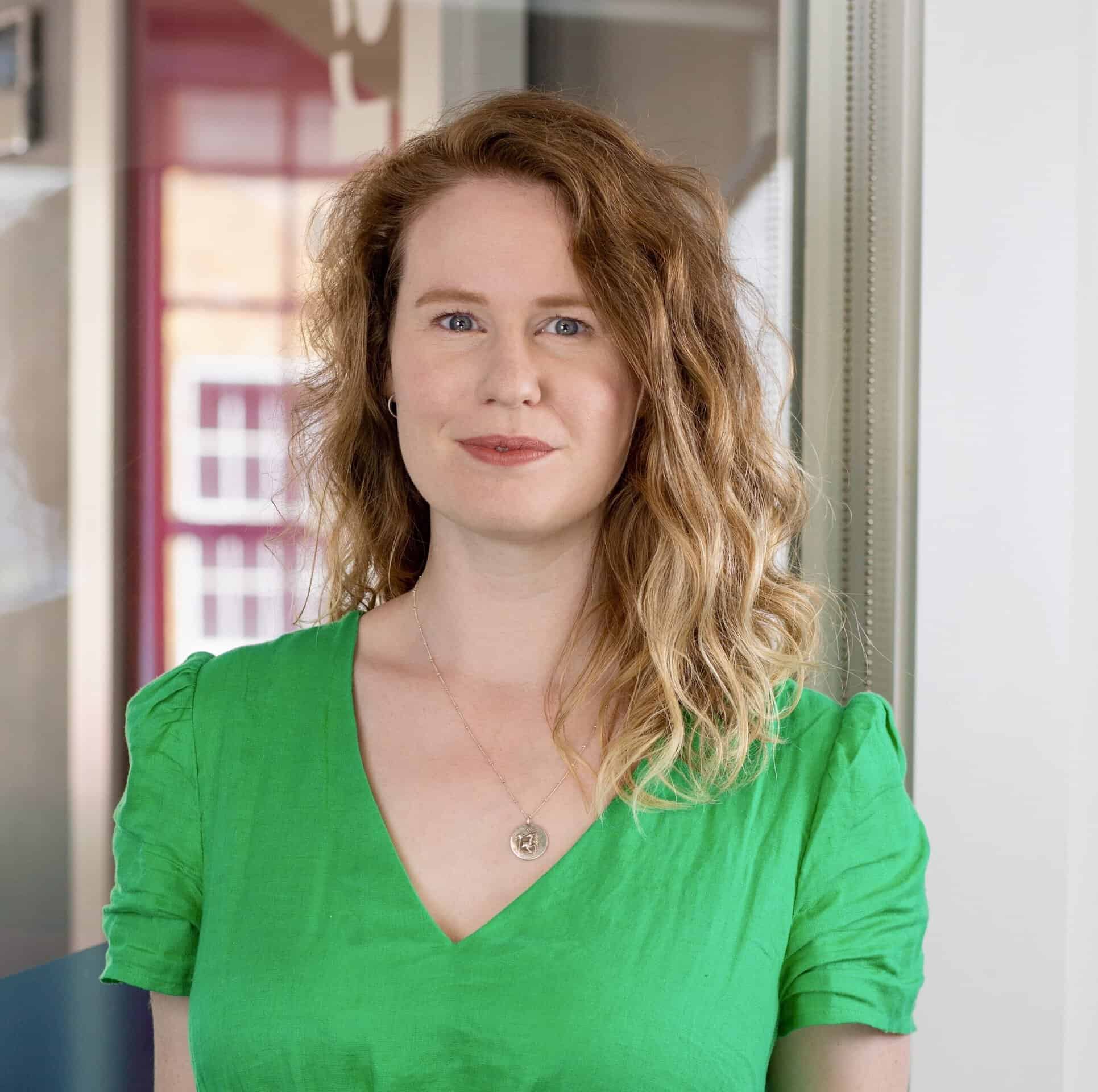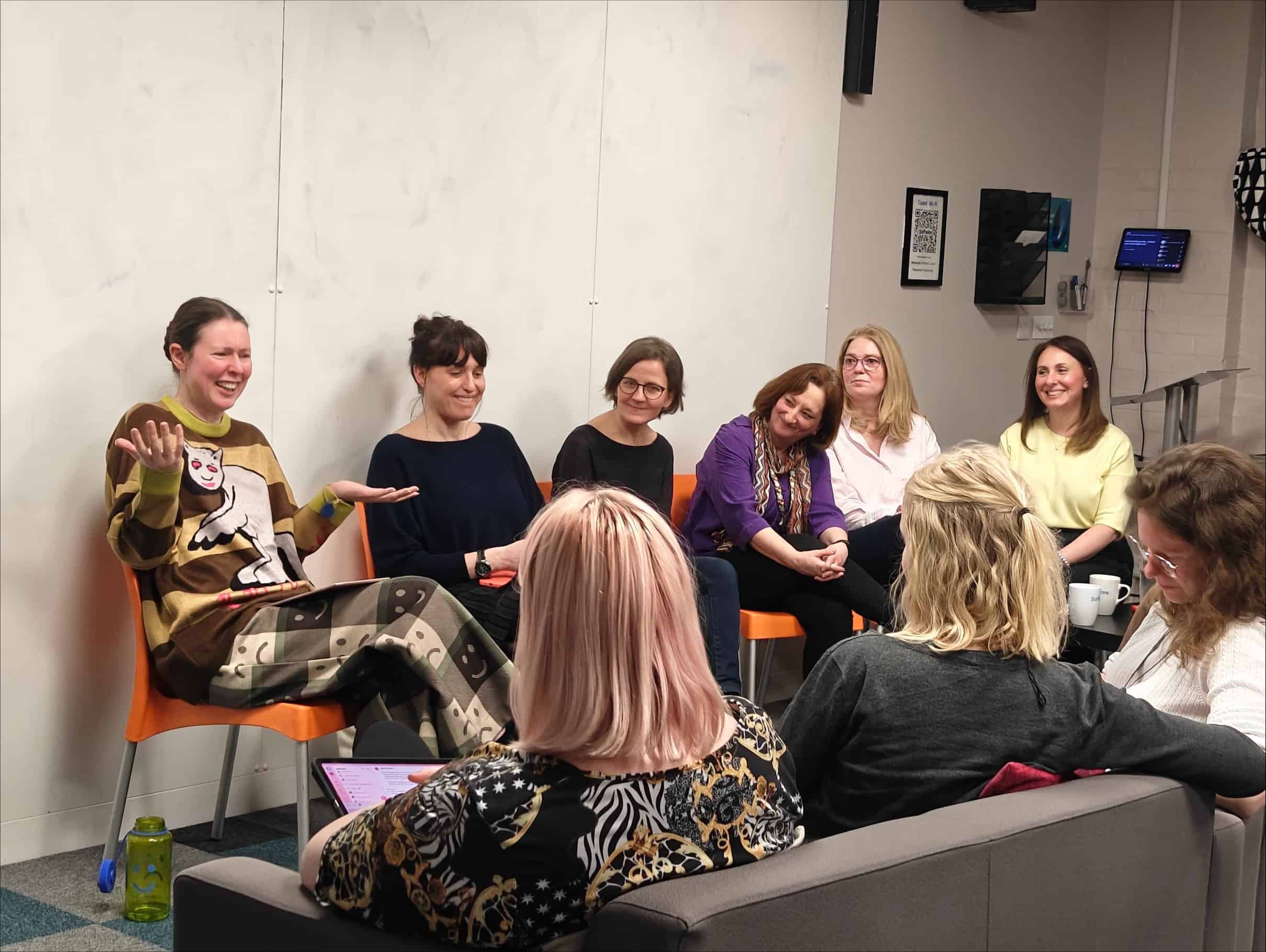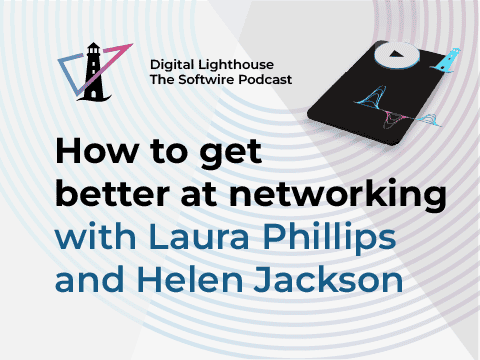“Anyone can be a software developer. You don’t have to have a specific background. You don’t have to have specific qualifications. You can come in and you can do it.”
Sasha Burgoyne, Head of Academy at Softwire, co-founder of TechSwitch
Changing careers can be highly rewarding for employees and employers alike. Yet it’s also daunting – especially for women.
Despite progress from DE&I efforts, women still face a daily battle with inequality and bias. Research shows they face higher rates of microaggression and are twice as likely to be mistaken as a junior employee and receive negative comments about their emotional state.
Mix that with imposter syndrome, and the route to switch careers or return to the workplace can feel like a minefield.
That’s why there’s a clear need to provide the right support, tools, and training to support career switchers and returners.
In this episode of The Digital Lighthouse, host Zoe Cunningham explores the challenges and opportunities for women career switchers and returners in tech with Sasha Burgoyne and Esme Chant from Softwire.
Join them as they discuss:
- Why women career switchers need additional support in tech
- Creating supportive workplace environments for career switchers
- The value career switchers bring to tech organisations
- The structure and benefits of the TechSwitch program
Listen below:
About our guests

Sasha Burgoyne
Head of Academy at Softwire, co-founder of TechSwitch.
Sasha Burgoyne is the co-founder of TechSwitch, an award-winning software development training programme for career switchers looking to move into tech, as well as people looking to return to the workplace. She is also Head of Academy at Softwire which delivers training in DevOps and software development and has been part of Softwire’s DEI Working Group since its inception. In between helping people break into the tech sector, Sasha spends a lot of time crocheting and playing video games.

Esme Chant
D&I Lead and a People Advisor at Softwire
Esme Chant is the D&I Lead and a People Advisor at Softwire. She has played a key role in enhancing inclusivity within the company by implementing practical solutions, such as neurodiversity awareness training, facilitating reasonable adjustments, and creating a D&I calendar to ensure that various identities are recognised and celebrated. Additionally, she actively works on programs aimed at improving inclusivity. In her free time, Esme enjoys travelling, running, and engaging in anything crafty.
Transcript
[00:00:01]
Zoe Cunningham: Hello, and welcome to The Digital Lighthouse. I’m Zoe Cunningham. On The Digital Lighthouse, we get inspiration from tech leaders to help us to shine a light through turbulent times. We believe that if you have a lighthouse, you can harness the power of the storm. Today, I’m delighted to welcome Sasha Burgoyne and Esme Chant, both from Softwire. Please can you tell me a bit about yourselves and what you do, and also tell us a bit about what you do at Softwire?
[00:00:32]
Esme Chant: Yeah. Sure. So, yeah, I am Esme Chant. I have been at Softwire now, come back to five years, which is crazy. I work in the People and Culture department. And over the last year, I’ve been focusing on DE and I, so I’m the DE and I lead now.
[00:00:48]
Sasha Burgoyne: And I’m Sasha Burgoyne, and I am Academy Head of Operations at Softwire, which means I run our Internal Academy, so various different bits of training internally, but also our TechSwitch program, which was set up about five years ago now, actually, and that is aiming to provide an accessible route into tech for people who don’t currently see themselves represented in the industry.
[00:01:11]
Zoe: Amazing. So today, we are gonna be talking about how to support women career switchers. And I’d like to start by asking why do women career switchers need more support?
[00:01:2]
Esme: Well, yeah, there’s a number of reasons why career switchers need support. The McKinsey ‘Women in the Workplace’ reported actually, there’s, like, years of data that show women experience microaggressions on a much higher rate than men. For example, they’re twice as more likely to be mistaken for a junior employee or to have comments on their emotional state.
So these seem like little things, but they add up, don’t they, to your confidence? And then if you sort of, like, put that on top of sort of imposter syndrome so, you know, last year’s report, the Code First Girls they reported that 82% of career switchers experience imposter syndrome. So this obviously creates quite a mind field for these women when they’re reentering the workplace. So it’s, yeah, just super important once we get these women into the workplace that we’re giving them the right sort of support and tools to be retained.
[00:02:19]
Zoe: Yeah. So if you’re creating that route in, make sure that you are following up and supporting as well. So, Sasha, maybe you could tell us a bit about what TechSwitch is. You mentioned it earlier.
[00:02:30]
Sasha: Yeah. Sure. So the idea is that it’s aiming to provide a supportive route into software development. So it’s a twelve-week boot camp working on full stack development. And with that, we provide a lot of additional support. So you’ll have the support from your trainer, from a technical standpoint. You also get a career adviser, so they will help you build a CV and profile. They will be the ones as well sending your CV out to potential employers.
So one of the things we do at the end of the program is try to find you a job as part of it, so get your foot in the door on that first either kind of career change or as you’re returning to work. And then we also do interview practice and support, so we provide mock interviews for all of our learners, which I think is really important for career switchers and returners because a lot of them will have, you know, spent a really, really long time throwing their CVs at various different job applications and just having had nothing back.
So a lot of the time when we interview people for TechSwitch, they say to us, this is the first interview I’ve had in potentially 20 years for some of them. And that is obviously quite intimidating and particularly when they have been, you know, sending their CV out to those places and just haven’t heard back. That really, really, really knocks your confidence because you start to think, is it a problem with me? And it’s not. The answer is not a problem with you. It’s a problem with the kind of bias of recruitment in general, but it absolutely starts to feel that way. So a huge part of what we do is building that confidence back up and helping people to feel like they are supposed to be there and that they are going to be good at this job. And a big part of that is, as well, our pastoral support.
So in addition to all of the support that I’ve just mentioned, we also have a general mentor who will have weekly conversations with each of the learners just to make sure that they’re settling in well, that they haven’t got any worries. Often, we talk quite a lot about stuff that’s going on in their personal life because it can be quite a big change as well for potentially their family if they’ve been used to having someone around all of the time and all of a sudden this person is now working at ten ‘till four course every day. That can be an upheaval for them too. So we have a really, really good team to support everyone around that.
And, yeah, like I said, it’s not just about the technical side of it. We also want to make sure that you get a really good understanding of the vocational aspects of being a software developer. So we don’t just teach you how to code in one language. We teach you multiple languages, and we also teach you a lot about all the different agile ceremonies. We teach you about, like, Git hygiene, teach you about databases, all of these different things because I think something actually that a lot of our learners say to us when they’ve got a job after TechSwitches, I thought there’d be a lot more coding involved in the job than there actually is. It’s always a bit of a surprise how much there’s other stuff that you have to do around the coding, Zoe. You will obviously know this from your time as a developer.
[00:05:13]
Zoe: I definitely remember it wasn’t the coding. You know, when I was a junior software developer, it wasn’t the coding so much that threw me as the deployment practices or, like you say, using things like GitHub that everyone else can just use, but are quite nonintuitive if you haven’t done it before. And often, there’s a whole load of words even that you don’t know what they are. So, yeah, I can see how important it is to make sure that that’s part of the course before people even hit, you know, the workforce.
[00:05:42]
Sasha: Yeah. Exactly. And one of the things we do as well, and this may seem slightly mean, the course is definitely a lot more intensive than the actual job. So, again, something we hear a lot is when they start their first job, they go, oh, this is a lot easier than the course. I’m just like, yes. That is to an extent, that is on purpose because, I mean, obviously, part of it is that there’s only 12 weeks, and we have a lot to fit into that. But, also, it means that when you start that job, you don’t feel overwhelmed because you just have 12 weeks of feeling overwhelmed, and there’s been new stuff being thrown at you all the time.
On a job, you’re not having new things thrown at you all the time. You’ll normally have one codebase that you’re working with over a much longer period of time, and you get to become an expert in. And I think that having that ability to potentially, like, hop around to different things that we have taught them over the course of the boot camp is actually really, really valuable, but also makes it easier to then settle into the actual job.
[00:06:31]
Zoe: Yeah. Fantastic. So I feel like you’ve answered my next question already, which is what do career switchers bring to the workplace? Because I feel like having just gone through all of that, I can see that there’s a lot they’re bringing just from being on the course. But what else do you find that you can really benefit from having career switchers in your workforce?
[00:06:49]
Sasha: Yeah. I think there’s a lot of things that they bring, and a lot of it is life experience. It’s very different from someone who’s coming straight out of university into, you know, their first kind of corporate role. Someone who has done that before or has even been spending a lot of time raising a family, you are coming out this with some absolutely incredible organizational abilities, but also really, really strong communication skills as well. And that really is things that you only learn a little bit later on in your career or from having to do something outside of that such as caregiving responsibilities.
And I think that career switchers and returners are just this huge untapped pool of talent that are also highly motivated. I’ve honestly never met a group of people who are more motivated to get back into the workforce. When you see the number of hurdles that they have to overcome in order to get there, and they still want to do it, like, that drive is just so so valuable to employers.
[00:07:42]
Zoe: I think there’s something about, isn’t there, that once you’ve had that broader experience of life, you do learn what is valuable, and you do learn that a good flexible job and a good employer is so valuable and is very motivating.
[00:07:56]
Sasha: Yeah. Absolutely. And I think as well, they tend to not want to be hopping around a lot. So, generally, they’ll want to go somewhere, stay there for a longer period of time, and make improvements to that place rather than having a little bit of a grass is greener outlook. You know, they’ve been there. They’ve done it. They’ve seen everything, so they know when they found a good place that they want to stay there, and I think that’s also just a really valuable aspect.
[00:08:19]
Zoe: Great. Well, Esme, as well as running TechSwitch, we also hire a lot of career switchers into Softwire. So can you tell me a bit about what Softwire does to kind of bridge that gap we were talking about earlier, you know, making sure that as well as giving people the opportunity, we’re supporting them once they’re in the workplace.
[00:08:38]
Esme: Well, yeah, you sort of flag some of the points. Like, a lot of these tech returners or switchers have family commitments, you know, and have lives outside of work that they need to prioritize as well. So a big thing is offering flexible working options. So, you know, whether that’s you know, you gotta pick up your kids from school or, you know, we’ve got an aging population and elderly parents. You might need to go look after them as well. Given a space where you can be flexible with your hours is super important or sort of different kind of working patterns, maybe not the traditional five days, but maybe you work four days a week instead. So that’s a real key thing. But also a big thing is a lot of people move because they don’t see career progression at the roles that they were in, so they switch sectors to try something new.
When they come into Softwire, it’s really important that we’re tracking sort of their progress, and are we retaining them? And, you know, if they’re not tracking that sort of, like, kind of the standard, right, why is that? Are we giving them the learning opportunities to get up to speed with GitHub to make them feel confident, or do they need mentoring? You know, it’s really important to feel like you are reflected in the workplace, and maybe we could do more conscious mentoring. So, yeah, there’s lots of different things, but they are some of the things we’re trying to do to help career switchers, which actually are some of our TechSwitches. They are a recruitment pool brass, and, yeah, Sasha and the team are doing, um, great support as sort of, like, getting them ready for the workplace.
[00:09:58]
Zoe: Yeah. I like, you know, when you were talking then, you were talking about the outcomes as well as just, like, what you’re doing. Like, I think it’s too easy in these kind of welfare initiatives to be like, well, we’ve put our meditation on, and we’ve got a yoga session, and we’ve got this flexible working scheme you can apply for if you jump through all these hoops. But, actually, it’s not about the specific incentives. It’s about making sure that things are working for people and being responsive to that. You know, making sure you find out what people’s challenges are and respond to them, as well as having standard schemes in place. Having said that, I know there is one scheme that Softwire runs, which is the LevelUp program specifically to help women in the workplace. Can you tell me a bit about that?
[00:10:42]
Esme: Yeah. So at the end of last year, we partnered with Jo Phillips. So she is a Global Facilitator, and her motto is “the woman behind the women”, which I think is a great motto. So we had an internal team work together with her to create a program which is meant to empower women at Softwire to drive their own careers. So it’s over a four-month period, and there’s four sort of, like, units within it. So there’s cultivating self-belief, building personal brand, networking, and, like, goal setting and career planning. So we’ve just finished our two pilot cohorts. So that was in March, and it’s, yeah, had, um, positive feedback. But what we wanted to do now is look at the feedback, iterate the program, and to bring it completely in house. So we’re looking at maybe getting some of our senior women to lead, like, some of the modules to really tap into the knowledge that we have here.
So we’re hoping to roll a couple more cohorts out later this year. But another big part of this program is, you know, getting these women to drive their careers, but also create a network within Softwire. So they’re really wanting to try and, once the cohort’s finished, for these women to act as a support group for each other and be allies because groups have been made up of women of all different seniorities across the company. So we’re still in the process of forming it and getting it quite right that the pilot’s been successful. So watch this space, Softwire.
[00:12:09]
Zoe: Fantastic. Sasha, I wanted to kind of round out a bit because I think we’ve been talking a lot about what support do career switchers need. Is there a risk that we end up saying, oh, career switchers, they’re really needy. You know, they’re gonna be a load of hassle if you add them to the workplace. Is it true that they’re more needy than other employees?
[00:12:26]
Sasha: I think, yeah, I see where you’re coming from with that because I think they do need a lot of support, but it’s a very different kind of support to what we generally expect. So, again, it comes back to the difference between them and a graduate. So they generally won’t need the kind of support, the way you might be having to tell them how to do things, how to work around certain things. They won’t need you to kind of help them with basic day to day stuff. You won’t need to be kind of, like, micromanaging them to make sure they don’t say something bad in front of a client. Like, that’s all there.
The thing that they need really is the reassurance that there is a support system there. And for so many of them, there’s the worry that they’re going to turn up on day one, be sat down in front of a computer, and then just left and, you know, that someone’s assuming that they will just understand what’s going on. And often, it is just that little bit of reassurance because a lot of them for example, if you’re returning after, you know, ten, fifteen-year career break, the corporate world looks very, very different how it did back then, and there is a lot more support and a lot more of you know, your manager isn’t anymore the kind of person who’s there to spot you if you’re doing something wrong. Right. Yeah. It’s now someone who’s there to support you and to help you through. And I think that’s a really big mental shift for a lot of them because they’re not used to having had that kind of, basically, support and mentorship available. For them, it’s always been more of a case of having people who are part of a very strict hierarchy and who are, you know, there to pick you up on things that you’re doing wrong.
And it takes I think the support aspect is around showing them that that’s not the case anymore, and that actually coming in asking help and asking questions is absolutely encouraged and something that we really want from them. So, yeah, it’s, I think, that initial kind of communication piece around making sure that they know that doing something wrong isn’t the end of the world and that it is okay to have questions and to be able to ask about things and to have someone who’s there and got your back. And I think that’s the really key thing for them.
[00:14:17]
Zoe: It’s really interesting, isn’t it? Because I think societal attitudes have changed. And I’m always a bit loath to say, oh, the whole world is like this, but certainly at Softwire, we very much value when employees come to us and say, this isn’t working or I can’t do this because of this so that we can implement it. And I think the world is changing from a world where, you know, it was kind of like, show no weakness. If you say you’re struggling or something is a challenge, that’s just gonna be a black mark. There’s no benefit to you to telling anyone that. You know? That’s just gonna be a problem for you, so you had to just kind of keep quiet and soldier on. And I think now there is a lot more opportunity to get support if you ask for it, but you have to know the options there to be able to take advantage of it.
[00:15:07]
Sasha: Yeah. Exactly. And I think as well, it’s often about finding those companies that are going to be able to provide you with that. So it’s something at TechSwitch we’re very, very keen on making sure that the companies that we partner with all align with our values and are going to provide that level of support because we would never want to put our learners in a position where they felt like they weren’t being supported. So that’s a really important part for us as well.
And I think something that people reentering the workplace again kind of forget is that you can interview the interviewer when you’re looking for a role as well. It’s as much as about that place working for you as it is you working for them. So I think, yeah, as you say, it’s often about making sure that the place aligns with your values as well of what you’re going to need out of it because if someone’s taking on loads and loads of career switchers or returners but hasn’t actually put any thought into how they’re going to be integrated into the workforce, then it probably wouldn’t be that great of an experience.
[00:15:59]
Zoe: Yeah. Absolutely. Okay. So if anyone’s listening and they were interested in a program like TechSwitch, like, what can they expect, and what should they do to maybe prepare for it?
[00:16:11]
Sasha: Yeah. So I think the very first thing is, basically, have a look at some of the free resources out there for learning how to code. So there’s Codecademy. And then when you want to start kind of solving some problems, there’s things like Codewars. There’s loads and loads of different free things out there because it might be that you think, oh, software development sounds great, and then you have a go at it, and you’re like, oh, this isn’t for me. And that’s fine. Like, we’re not trying to tell anyone that this is the best industry ever, and it’s for absolutely anyone. But what I do think is I would say it’s like Ratatouille where they always say, you know, anyone can cook. It’s the same. Anyone can be a software developer. You don’t have to have a specific background. You don’t have to have specific kind of qualifications. You can come in and you can do it. I mean, my career switched into tech, and I have an arts degree. So, like, anyone can do it.
And I think that’s the really important thing is finding out whether or not it is something that you enjoy. Does it kind of scratch that little puzzle-solving itch? In which case, then, yeah, it might well be for you, and that would be my advice for the first step. And then find a boot camp or program that’s gonna work for you. Don’t feel like you have to go for the first one that’s available or the easiest one to get into. Really, really find one that is actually going to work for you because there are so many of them out there now that it is, like, confusing, to be honest. And, yeah, making sure that it’s one that has all of the things you want to get out of it is really important.
[00:17:24]
Zoe: Great. So someone’s done all this research. They’ve checked out the coding site. So how do they specifically apply to TechSwitch?
[00:17:30]
Sasha: Yeah. Sure. So go on our website. There is a handy little application form, and we will get back to absolutely every single person who applies to us. So most of our placements are based in London. We normally check, like, whether that’s going to be an issue or not. So once we’ve checked that that’s all okay, we will then get you to do some online tests, which will be a little bit of JavaScript. We will signpost some materials for you to learn some JavaScript and to kind of get up to speed with them. We’ve got some materials on our website as well if you want to use those.
And then following the online tests, there is a chat in person with one of our team who will kind of just have a little conversation with you about your background and why you want to join TechSwitch. And then following that, there’s another technical interview and that will be in person with an actual real life software developer, and they will take you through a big bit of code that needs some things fixing. And that’s it. That’s the process.
[00:18:18]
Zoe: Okay. Amazing. And that website is www.techswitch-
[00:18:24]
Sasha: .co.uk.
[00:18:25]
Zoe: .co.uk. There we go. So thank you so much, Esme and Sasha. I think this is an important topic, and I always get very excited about diversifying the workforce and bringing in new ideas and new experiences. So, yeah, thank you both very much.
[00:18:39]
Sasha: No. Thanks very much. It’s been really great.
[00:18:40]
Esme: Yeah. Thank you so much.
[END OF TRANSCRIPT]



